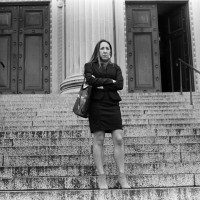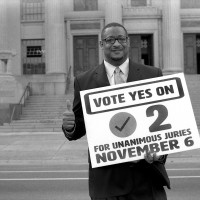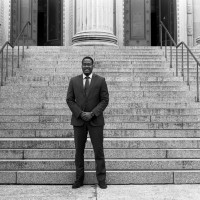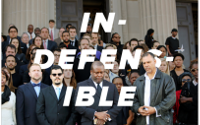OPD Launches Campaign to Create an Equitable Criminal Legal System in New Orleans
- News

We are operating under our third Restriction of Services (ROS) plan in seven years. As a consequence, we are unable to assign investigators to most cases, and soon we will have to cease providing counsel in cases where we have ethical conflicts. Louisiana’s and New Orleans’ user-pay criminal legal system desperately needs reform – it is inadequate, unreliable, and unstable. It is also inequitable and unfair. The effects of these inequities are manifest: wrongful convictions, overdetention, mass incarceration, inefficiency, waste, high costs, and community distrust.
OPD represents 85 percent of all criminal cases in Orleans Parish, and is responsible for thousands of municipal and traffic court cases each year. In 2018, OPD represented nearly 25,000 cases. Yet, OPD received less than one quarter the local appropriation given to the District Attorney. In 2019, New Orleans will spend a staggering $258 million to arrest, prosecute and incarcerate our citizens, but just $1.8 million to protect innocence, provide accountability and ensure a fair and equitable criminal legal system.
The Appeal: Louisiana Prosecutors Use the Habitual Offender Statute to Jail People for Life. Attorneys for Lifers are Fighting Back
- News
The Appeal dug into Louisiana's practice of using the habitual offender statute to penalize people for prior convictions and obtain substantially longer sentences from defendants, frequently life sentences.
Under Louisiana’s habitual offender statute, a district attorney can file to have a person’s punishment enhanced based on their criminal history. In 2011, Bernard Noble was sentenced to 13 years in prison after he was arrested in New Orleans for possessing two marijuana joints because of prior drug convictions. Noble served seven years and was granted an early release. In 2016, Jacobia Grimes faced 20 years to life for allegedly stealing $31 worth of candy bars from Dollar General store in New Orleans after Orleans Parish DA Leon Cannizzaro charged him under the habitual offender statute. The case received national attention, and Grimes later entered a guilty plea in which he was sentenced to two years in prison.
Antigravity Magazine: Looking for Justice at Tulane and Broad
- News
Recently, Antigravity Magazine sat down with Staff Attorney Alexis Chernow for its new series Looking for Justice at Tulane and Broad to discuss everything from her experiences as a public defenders, managing an aggressive district attorney's office, Louisiana's astronomical incarceration rates and recommendations for reforming the system.
"Everyone deserves to be treated with dignity, whether incarcerated, in the street, presumed innocent, adjudicated guilty. I feel honored to be able to stand shoulder-to-shoulder with my clients and to have the opportunity to learn about who they are beyond a police report or a rap sheet. I think one of the most important things we as public defenders can do is to be the one person in the room who remains in our client’s corner, continuing to view, treat, and advocate for our clients as human beings, rather than as case numbers, criminals, or statistics."
To read the full interview visit Antigravity Magazine.
Antigravity Magazine: Looking for Justice at Tulane and Broad
- News
Part two of the ongoing Antigravity Magazine series Looking for Justice at Tulane and Broad, features Staff Attorney Brian Woods discussing his motivation to be a public defender, the habitual offender law and the recent passage of Amendment 2 which ended non unanimous juries across Louisiana.
"I wanted to do my part. I wanted to be a voice for the poor people of New Orleans. I wanted to let them know they had a zealous advocate even if they didn’t have any money. I wanted them to know there was hope and that I would fight for their rights against a system that believes in punishment rather than rehabilitation."
To read the full interview, as well as part 1, visit Antigravity Magazine.
Antigravity Magazine: Looking for Justice at Tulane and Broad
- News
Part three of the ongoing Antigravity Magazine series Looking for Justice at Tulane and Broad, features Staff Attorney Robert McKnight on warrants and attachments, the community effort to resolve them, as well as the modern day debtors' prison impacting so many and the fight to end it.
"I have people who look me in the eyes and say, 'Mr. McKnight, I’m gonna pay for myself to get out of jail, but how will I pay my light, gas, and water? How do I put food on my table? How would I get diapers for my child? How do I get bus fare to and from?' These are decisions no human being should have to be faced with."
To read the full interview, as well as parts 1 and 2, visit Antigravity Magazine.
Antigravity Magazine: Looking for Justice at Tulane and Broad
- News
 Part four of the ongoing Antigravity Magazine series Looking for Justice at Tulane and Broad, features Bond Attorney and veteran Tulane and Broad public defender, Meg Garvey on the importance of Magistrate Court, the often overlooked impact that initial court hearing can have to the outcome of a case and the changes she's seen over the last decade.
Part four of the ongoing Antigravity Magazine series Looking for Justice at Tulane and Broad, features Bond Attorney and veteran Tulane and Broad public defender, Meg Garvey on the importance of Magistrate Court, the often overlooked impact that initial court hearing can have to the outcome of a case and the changes she's seen over the last decade.
"Part of the reason is that we have different people working there, but I also think it’s just been years and years of people like me and my colleagues grinding them down and saying: no, we’re going to keep showing up every day and demand that you do things according to the law. Over and over again. 365 days a year, for years, is really what that took."
To read the full interview, as well as parts 1, 2 and 3, visit Antigravity Magazine.
OPD IN THE MEDIA
HBO's Last Week Tonight with John Oliver Talks Public Defense featuring OPD
Public Defense Matters
See our new YouTube channel and listen to some of our stories.
Indefensible: The Story of New Orleans' Public Defenders
More than 80% of defendants in New Orleans can’t afford a lawyer ...
When the Public Defender Says, ‘I Can’t Help’
“Your Honor, we do not have a lawyer for this person at this time.”








